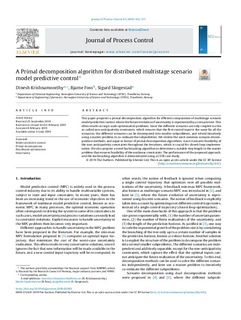| dc.contributor.author | Krishnamoorthy, Dinesh | |
| dc.contributor.author | Foss, Bjarne Anton | |
| dc.contributor.author | Skogestad, Sigurd | |
| dc.date.accessioned | 2020-01-14T08:26:21Z | |
| dc.date.available | 2020-01-14T08:26:21Z | |
| dc.date.created | 2019-09-19T17:24:29Z | |
| dc.date.issued | 2019 | |
| dc.identifier.citation | Journal of Process Control. 2019, 81 162-171. | nb_NO |
| dc.identifier.issn | 0959-1524 | |
| dc.identifier.uri | http://hdl.handle.net/11250/2636065 | |
| dc.description.abstract | This paper proposes a primal decomposition algorithm for efficient computation of multistage scenario model predictive control, where the future evolution of uncertainty is represented by a scenario tree. This often results in large-scale optimization problems. Since the different scenarios are only coupled via the so-called non-anticipativity constraints, which ensures that the first control input is the same for all the scenarios, the different scenarios can be decomposed into smaller subproblems, and solved iteratively using a master problem to co-ordinate the subproblems. We review the most common scenario decomposition methods, and argue in favour of primal decomposition algorithms, since it ensures feasibility of the non-anticipativity constraints throughout the iterations, which is crucial for closed-loop implementation. We also propose a novel backtracking algorithm to determine a suitable step length in the master problem that ensures feasibility of the nonlinear constraints. The performance of the proposed approach, and the backtracking algorithm is demonstrated using a CSTR case study. | nb_NO |
| dc.language.iso | eng | nb_NO |
| dc.publisher | Elsevier | nb_NO |
| dc.rights | Attribution-NonCommercial-NoDerivatives 4.0 Internasjonal | * |
| dc.rights.uri | http://creativecommons.org/licenses/by-nc-nd/4.0/deed.no | * |
| dc.title | A Primal decomposition algorithm for distributed multistage scenario model predictive control | nb_NO |
| dc.type | Journal article | nb_NO |
| dc.type | Peer reviewed | nb_NO |
| dc.description.version | publishedVersion | nb_NO |
| dc.source.pagenumber | 162-171 | nb_NO |
| dc.source.volume | 81 | nb_NO |
| dc.source.journal | Journal of Process Control | nb_NO |
| dc.identifier.doi | 10.1016/j.jprocont.2019.02.003 | |
| dc.identifier.cristin | 1726922 | |
| dc.description.localcode | ©2019The Authors. Published by Elsevier Ltd.This is an open access article under the CC BY license (http://creativecommons.org/licenses/by/4.0/) | nb_NO |
| cristin.unitcode | 194,66,30,0 | |
| cristin.unitcode | 194,63,25,0 | |
| cristin.unitname | Institutt for kjemisk prosessteknologi | |
| cristin.unitname | Institutt for teknisk kybernetikk | |
| cristin.ispublished | true | |
| cristin.fulltext | postprint | |
| cristin.fulltext | original | |
| cristin.qualitycode | 2 | |

